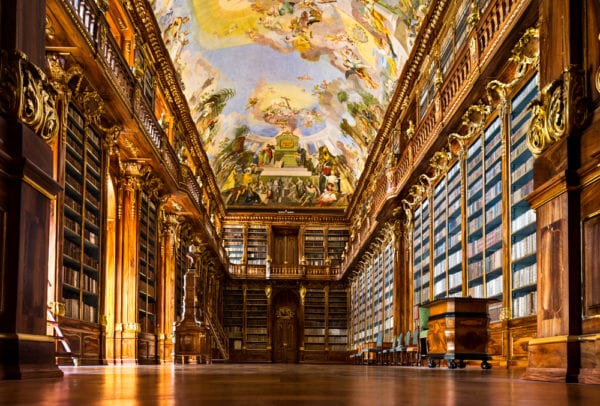The library as Paradise
The library as Paradise
The library as Paradise
-
Hannah
-
Hannah

‘I have always imagined that Paradise will be a kind of library.’ So wrote Argentine writer Jorge Luis Borges.
How many book lovers have since taken these words to heart? Here are just a few of the gifts on offer for those who find affinity with the quotation:

(Sources: T-shirt; cushion; oak bookmark; metal bookmark; bag.)
What is paradise? According to the Oxford English Dictionary, it is:
1) (in some religions) heaven as the ultimate abode of the just
2) an ideal or idyllic place or state.
Certainly, that fits my idea of a library: cool, quiet, serene; a place of beauty and decorum full, as Thoreau put it, of ‘the treasured wealth of the world’.
I have written before of my love of libraries; in my blog post ‘The roots of a bibliophile: The Ancient Library of Alexandria’ I shared how that love began, in my birthplace of Alexandria, home to the most significant library in history. Since leaving Egypt I have travelled widely, and wherever I go libraries are on the ‘must see’ list. Whenever I take a research trip for my writing, I visit the city’s library, where not only can I read all about the local history and culture, but I get a feel for the spirit of the city. (In Venice, setting for The Echoes of Love, this was especially inspiring; the city has no less than seven libraries. My favourite was the Biblioteca Nazionale Marciana [National Library of St Mark’s], which is in a beautiful Renaissance building that holds some of the great classical texts, including illuminated manuscripts.)
Visiting a library, in many ways, is a simple pleasure in life; but for so many of us it is a powerful one: educative, inspiring, comforting. Libraries are so important, I believe passionately that they must be preserved and open to all, like this one: the Philosophical Hall at the library of the Strahov Monastery, Prague.

The headline of a recent article in Guardian caught my eye: ‘The most expensive library in the world?’ Intrigued, I clicked to read the article expecting, based on the image of a sumptuously decorated library, to learn of a new library that had been expensive to open. No doubt the stunning Book Capella in St Petersburg – designed in the fashion of an ancient library, complete with tapestries, murals, sculpted woodwork, stained glass windows and religious statues – did cost a great deal to create. But in fact the article’s headline was referring to the entrance fee to the library: £100 for a four-hour reading session.
This is not a public library, but a private collection owned by a publishing house spanning some 5,000 books dating from the 16th to 19th centuries – and available for purchase, we are told, for £400 and £700 each. For around £3,000, you can buy an annual pass to the library; a lifetime pass will cost you… £69,000.
Who is willing and able to pay to access this library? According to the project’s director, the library’s users are academics and book collectors – and businesspeople who can afford to meet in such luxurious surroundings. The director states:
Book Capella is not a library in the traditional sense, and it is not a museum, although elements of the museum are presented. It’s also not the bookstore, although you can buy our books here. [It] is a new way for people to communicate with rare books.
The motto for this ‘library’? ‘I have always imagined that Paradise will be a kind of library’ – Jorge Luis Borges.
But is Paradise exclusive? A place only those with means can enter?
Remember Thoreau’s description of books: ‘the treasured wealth of the world’. That is an excerpt from this quotation from Walden:
Books are the treasured wealth of the world and the fit inheritance of generations and nations. Books, the oldest and the best, stand naturally and rightfully on the shelves of every cottage. They have no cause of their own to plead, but while they enlighten and sustain the reader his common sense will not refuse them. Their authors are a natural and irresistible aristocracy in every society, and, more than kings or emperors, exert an influence on mankind.
I wonder what Thoreau would make of Book Capella.
Are libraries important to you? Do you think we should preserve them, and ensure equal access to all? I would love to hear your thoughts.